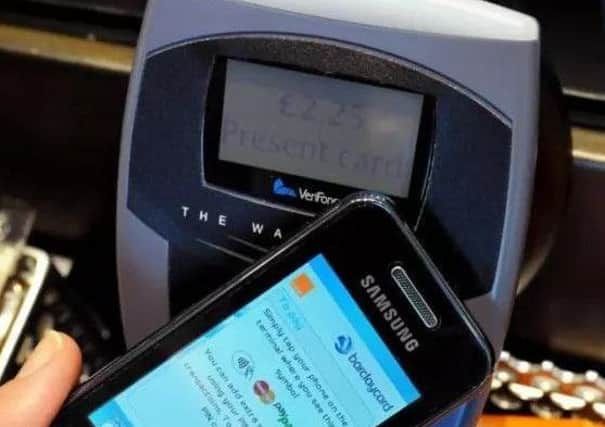GP Taylor: Digital cash pays off for grasping politicians


For the first time, payments by card and digital formats are about to overtake cash.
We as a society are growing more dependent on digital money. With the introduction of contactless payments, getting rid of the pound in your pocket might soon become a reality.
Advertisement
Hide AdAdvertisement
Hide AdDebit cards were used 11.6bn times last year, growing by 14 per cent, and by next year this will hit 13.4bn. That surpasses the use of cash, which is expected to be used for 13.3bn payments.
Those in government would love to see that day. They blame the black cash economy for stealing millions of pounds per year from the HMRC.
Believe it or not, some politicians say that each one of us is morally wrong if we pay a tradesman in cash. Giving your gardener, cleaner or handyman a few fivers for their work is frowned upon. The problem for the government is that they do not trust workers to declare what they earn. If they take from us the ability to pay with cash then they can trace every penny earned.
According to a report by the Public Accounts Committee, more than two million people make cash-in-hand payments, costing the Treasury an estimated £2bn in unpaid tax.
Advertisement
Hide AdAdvertisement
Hide AdIt is ironic that the likes of Apple and Starbucks can get away with paying minimal taxes in the UK whilst making vast fortunes while ‘Mrs. Smith’ at the car boot sale is investigated by the taxman.
When politicians talk about their dislike for the gig economy or the zero hour contract their primary concern isn’t about the welfare of the workers. I believe it is about the desire to get more and more money in revenue.
However, there has always been a gig economy and people will never give up doing a bit on the side and paying in cash. It is part of our culture and for too many people digital money has no real value.
For many, it is the pound in their pocket that counts. It is a tangible sign of wealth that can be spent as and when you want. Psychologists say that handing over a banknote to buy something is far harder than making a card payment as we can see our money vanish before our eyes.
Advertisement
Hide AdAdvertisement
Hide AdI have recently found that when I buy food with my card, the supermarket I use then emails me with offers relating to my last purchase. Moving to digital payments brings with it the annoyance of ever more email spam and someone somewhere knowing exactly what type of milk you like on your cornflakes.
In the digital economy, we become a number around which is built an algorithm. Everything we buy is built up into a complex picture of who we are. Not only can our algorithm be used for targeted advertising but, in the hands of a government, could be used against us. It is not only the HMRC who would benefit from knowing on what and how we spend our money.
Banks also love the idea of a cashless society. Without actual money, there will be no need for a high-street branch. Staffing levels can be drastically cut and thus profits increased. Customers will be forced to dial a call centre in some far-off land and speak to someone who calls himself ‘Derek’ and asks you about the football. This is not the face-to-face business that we in Yorkshire love so much.
Digitalisation of money also means that more and more transactions will be done on the web. Shops will cease to be of any use and our town centres will perish. Cash is a great leveller and is the life blood of the jumble sale, charity jar and village fete. It is used to tip waiters and the toss of a coin can settle any argument.
Advertisement
Hide AdAdvertisement
Hide AdIt is sad to see that even Jeremy Corbyn wants to see it gone. On this topic, he seems to side with the bankers and multinationals who would love us all to live without a pound in our pockets.
In the next weeks and months, you will hear the call for a cashless society to grow and grow. Politicians of all varieties will be the chorus girls of globalisation. They will harp and whine for the pound in your pocket to be replaced by an e-wallet that they can easily pinch from.
What all of these people seem to have over looked in their demand for digital money, is what happens when the lights go out or a cyber-attack and card cloning renders us all penniless? That doesn’t seem to have been thought through. My virtual money can be easily taken from me, unlike the fivers under the bed.